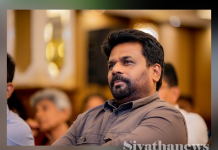A Sri Lankan doctor has been sentenced to three years in prison and faces deportation for sexually assaulting a patient at Bunbury Regional Hospital in Australia, an act described by a judge as a “gross breach of trust”.
P.P. Dayananda, a qualified neurosurgeon who was working as a surgical registrar at Bunbury Hospital had been found guilty of aggravated sexual penetration.
Judge Belinda Lonsdale said it was likely that Dayananda’s career as a neurosurgeon was over in the “short- to medium-term”.
She said the 49-year-old, who is a permanent resident of Australia but did not have citizenship, was likely to be deported “in due course”.
Dayananda will be eligible for parole after 18 months.
During his trial, Dayananda denied digitally penetrating his 45-year-old patient in late 2017, claiming he was a victim of mistaken identity.
But after a 10-day trial and almost 10 hours of deliberations, a jury found him guilty of the offence.
Prosecutors said the victim had suffered “lifelong mental trauma and emotional scars” from the assault.
Judge Lonsdale told the court the vulnerability of the victim was a relevant consideration in sentencing.
Dayananda’s lawyer, Simon Watters, said his client had experienced a “clear loss of the moral compass”.
During the trial, the court heard the woman initially went to Bunbury Regional Hospital in September 2017 with abdominal issues, after being kicked in the stomach by a former partner.
She underwent emergency surgery and spent two weeks in the hospital recovering, during which time she was seen by a number of doctors.
The prosecution told the court the victim had received “special attention” from one doctor who had asked her personal questions, stroked her hair and suggested he show her around WA.
Two months after being discharged, and while living at a women’s shelter, she developed an infection and returned to the hospital.
That is when the doctor who had asked her the personal questions assaulted her while she was lying in a hospital bed in a cubicle.
During an examination the doctor, whose name she could not recall, asked her out to dinner and made comments about her cleanliness as he sexually assaulted her.
Several days after leaving the hospital she began receiving text messages that she believed to be from the doctor, whose name she had saved in her phone contacts as “sleaziest slyest doctor”.
The communication continued over several weeks, with the contact suggesting the pair meet up.
Judge Lonsdale said when Dayananda claimed during his trial that someone else sent the texts, he was “lying through his teeth”.
The woman lodged a complaint and was asked to identify her attacker from a list of doctors.
Dayananda was on that list, but the woman selected a different man, also of Asian appearance.
The other doctor had also been on duty on the day of the incident and, like Dayananda, had treated the patient on previous occasions.
The defence argued the fact the second doctor had been identified by the victim was enough to cast reasonable doubt over the case, but the jury rejected that argument.
Prosecutors told the court Dayananda’s attempt to blame another doctor for the assault displayed a “total lack of remorse” for his crime.
















